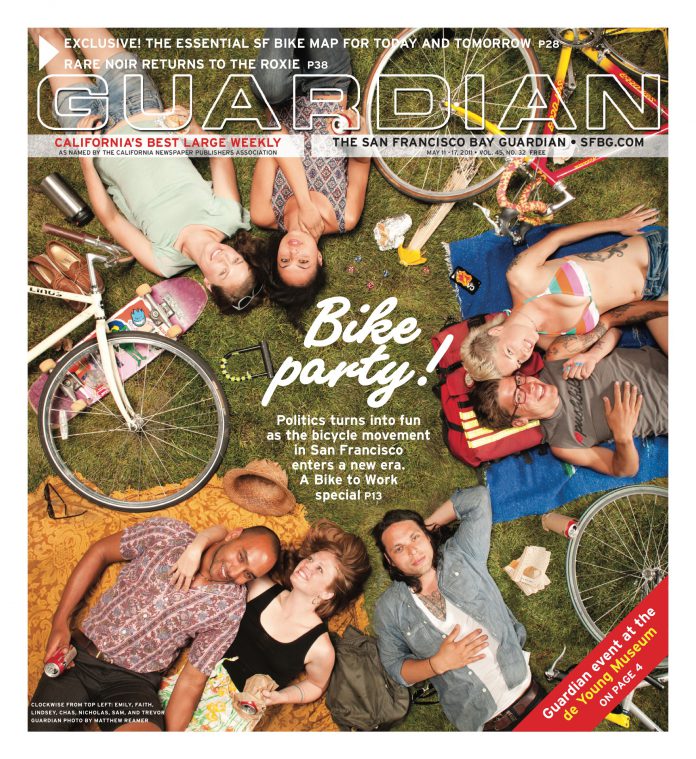arts@sfbg.com
Aaliyah has been an ephemeral touchstone for a number of different musical acts in recent years, with Gang Gang Dance citing her as an influence, James Blake sampling her voice, and The xx and Forest Swords covering “Hot Like Fire” and “If Your Girl Only Knew,” respectively, from her 1996 album One in a Million. In the last year, small fragments of her song “Rock the Boat” have also figured in albums by a pair of acts — Hype Williams and The Weeknd — that reshape elements of commercial R&B.
On “rescue dawn II (I am wiger toods),” from Find Out What Happens When People Stop Being Polite and Start Gettin Reel (De Stijl), the London-to-Berlin duo Hype Williams isolate the “Rock the Boat” line “Feel like I’m on dope,” slowing down Aaliyah’s voice in a manner similar to DJ Screw, and placing it next to off-key keyboards and video game sounds. The invocation of “Rock the Boat” in relation to Hype Williams’ name, which echoes that of the big-budget music video and movie director, creates or conjures subtext in a manner that’s both similar and markedly different from the inspirational way in which James Brown or Meters samples figured in early hip-hop.
Throughout Find Out What Happens, “Roy Blunt” and “Inga Copland” of Hype Williams borrow from disparate vocal elements, such as Pokémon rap and either a mutation or karaoke or obscure interpretation of Sade’s “The Sweetest Taboo.” While there’s a comedic quality to the album’s use of such sources, it mingles with a sense of time being altered. Whereas ’80s electronic musicians such as Harald Grasskopf or Scott Ryser of the Units have written about the difficulty of getting analog instruments such as Minimoogs to stay in sync while recording on tape, Hype Williams’ digital sound is riddled with moments in which melodies and rhythms deliberately fall out of step. Structurally, the duo’s new album One Nation (Hippos in Tanks) mingles randomness and more obviously constructed facets. Somber and meditative in comparison to the De Stijl collection, with free jazz atmospherics and beats to the fore, One Nation sometimes sounds like DJ Shadow, creating filigree at midnight in an imperfect world.
Bombast is not a part of Hype Williams’ sound, but it is present in The Weeknd’s self-released House of Balloons, a comparatively more polished recording that’s garnering roughly ten times the amount of attention on YouTube, a number that’s likely to increase. The Aaliyah loop on House of Balloons occurs seconds into the album’s second song, as a “hold you close” and a few other blurred words from “Rock the Boat” lead into a yearning dubstep-influenced ballad that works to differentiate between wants and needs, using echo effects to emphasize one while repeating the other like a mantra.
While Hype Williams generally sounds blunted or sleepy from syrup, speedier drug elements are laced throughout The Weeknd’s sound and the lyrics of House of Balloons. “House of Balloons / Glass Table Girls” begins with vocal and instrumental elements and a hook interpolated from Siouxsie and the Banshees’ “Happy House” before changing scenes halfway through, abandoning melodic, romantic, dramatic singing for a rap track set at an after-hours party gone awry. The next track, “The Morning,” begins with a blues lick and brings a sense of underlying anguish what is at least partly an account of a stripper’s jet-set lifestyle. “The Party & The After Party” is a seductive slow jam that uses Beach House’s “Master of None” (also present in Miranda July’s new movie The Future) as its musical bed.
As with the likely duo known as Hype Williams, the identity of the Weeknd, whether defined as Canadian singer-songwriter named Abel Tesfaye or a group of artists, has also been a matter of speculation. On blogs, websites, and in some publications, House of Balloons‘ comparative merit or weakness in relation to The-Dream, Drake, and other R&B contemporaries is a source of current debate. To dismiss any one of them outright in relation to the other is a simplistic response. In fact, R. Kelly is just as viable a comparison, and another way of returning to Aaliyah’s presence and the ways it can signify or suggest absence.

